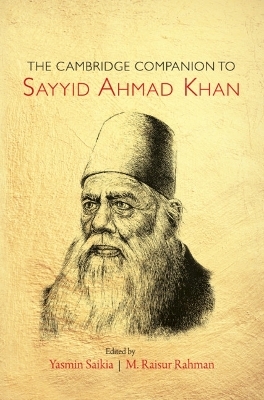
The Cambridge Companion to Sayyid Ahmad Khan
Cambridge University Press (Verlag)
978-1-108-48387-2 (ISBN)
This volume examines Sayyid Ahmad Khan's life, his contribution, and legacy in the context of current times. The editors engage his writings, ideas, and activities to read and present his work critically, not as a biographical account of his life but approach his work keeping in mind the tumultuous political events and changes of the nineteenth century, after the failed revolt of 1857 when Indians were transformed into colonial subjects. The collective anxieties of the Indian communities, particularly the Muslims, cried out for a new local leadership; Sayyid Ahmad Khan rose up to this occasion etching the way forward for Indians, in general, and Muslims in particular. Sayyid Ahmad Khan's multifaceted work offers an important understanding for national thinking emerging from the location of the Muslim, but it is not a 'minority' voice with vested political interests rather a constructive and integrative voice of relevance even today for addressing difficult problems.
Yasmin Saikia teaches History, and holds the endowed Hardt-Nickachos Chair in Peace Studies at Arizona State University. She is the author of three monographs, several edited volumes, and numerous articles and book-chapters. Her book Fragmented Memories: Struggling to be Tai-Ahom in Assam (2005) won the Srikanta Datta best book prize from the Nehru Memorial Museum and Library, New Delhi in 2005, and her book Women, War and the Making of Bangladesh: Remembering 1971 (2011) won the Oral History Association Biennial Book Award in 2013. Yasmin Saikia's research and teaching interests are multidisciplinary, including peace studies, cultural and intellectual history, religious history with a focus on Muslim South Asia, gender and violence, and memory and identity. M. Raisur Rahman teaches History at Wake Forest University, North Carolina. Trained as a historian of South Asia, his academic focus has been on the literary, social, and intellectual histories of Muslims in modern India. For the last two decades, he has closely studied the Muslim social and cultural ethos, and the salience of Urdu literary culture in the United Provinces – now Uttar Pradesh – in order to understand Indian and Muslim self-making that builds on interconnections and intersections. Rahman's teaching and research interests include local and urban history as well as colonialism and cultural encounters. He is the author of Locale, Everyday Islam, and Modernity: Qasbah Towns and Muslim Life in Colonial India (2015), and several articles and book chapters pertaining to Muslim South Asia.
List of illustrations; Notes on contributors; Acknowledgements; A chronology of Sayyid Ahmad Khan's life; Introduction Yasmin Saikia and M. Raisur Rahman; Part I. Sayyid Ahmad Khan: The Rise of a Historical Figure: 1. Sir Sayyid on history: the Great Revolt of 1857 and rethinking the 'rebellious' Muslim question Yasmin Saikia; 2. 'The Indian Muslims are the most loyal subjects of the British Raj': Sir Sayyid Ahmad Khan and the Caliphate Carimo Mohomed; 3. Sir Sayyid on 'the present state of education among Muhammadan females' Gail Minault; 4. Naicari nature: Sir Sayyid Ahmad Khan and the reconciliation of science, technology and religion David Lelyveld; Part II. Musalman-e-Hind: Indian Muslim in a Plural Environment: 5. Creating a community: Sir Sayyid and his contemporaries M. Raisur Rahman; 6. Envisioning a future: Sir Sayyid's mission of education Mohammad Sajjad; 7. Religion, science, and the coherence of prophetic and natural revelation: Sayyid Ahmad Khan's religious writings Charles M. Ramsey; 8. Defending the 'community': Sir Sayyid's concept of qaum Frances W. Pritchett; 9. Understanding the political thought of Sir Sayyid Mirza Asmer Beg; Part III. Sir Sayyid Today: Enduring Legacies: 10. Bridging the past and the present: how Sir Sayyid speaks to the twenty-first century angry protestors Mohammad Asim Siddiqui; 11. Darwin or design? Examining Sir Sayyid Ahmad Khan's views on human evolution Sarah Ahmed Kidwai; 12. Loss and longing at the qila mu'alla: Āṣār-us-Ṣanādīd and the early Sayyid Ahmad Khan Mrinalini Rajagopalan; 13. A living legacy: Sir Sayyid today Amber Abbas; Conclusion Yasmin Saikia and M. Raisur Rahman; Suggested further readings; Index.
| Erscheinungsdatum | 10.06.2019 |
|---|---|
| Zusatzinfo | Worked examples or Exercises |
| Verlagsort | Cambridge |
| Sprache | englisch |
| Maße | 165 x 236 mm |
| Gewicht | 530 g |
| Themenwelt | Literatur ► Briefe / Tagebücher |
| Geisteswissenschaften ► Archäologie | |
| Geschichte ► Allgemeine Geschichte ► Neuzeit (bis 1918) | |
| Geschichte ► Teilgebiete der Geschichte ► Kulturgeschichte | |
| ISBN-10 | 1-108-48387-9 / 1108483879 |
| ISBN-13 | 978-1-108-48387-2 / 9781108483872 |
| Zustand | Neuware |
| Haben Sie eine Frage zum Produkt? |
aus dem Bereich


